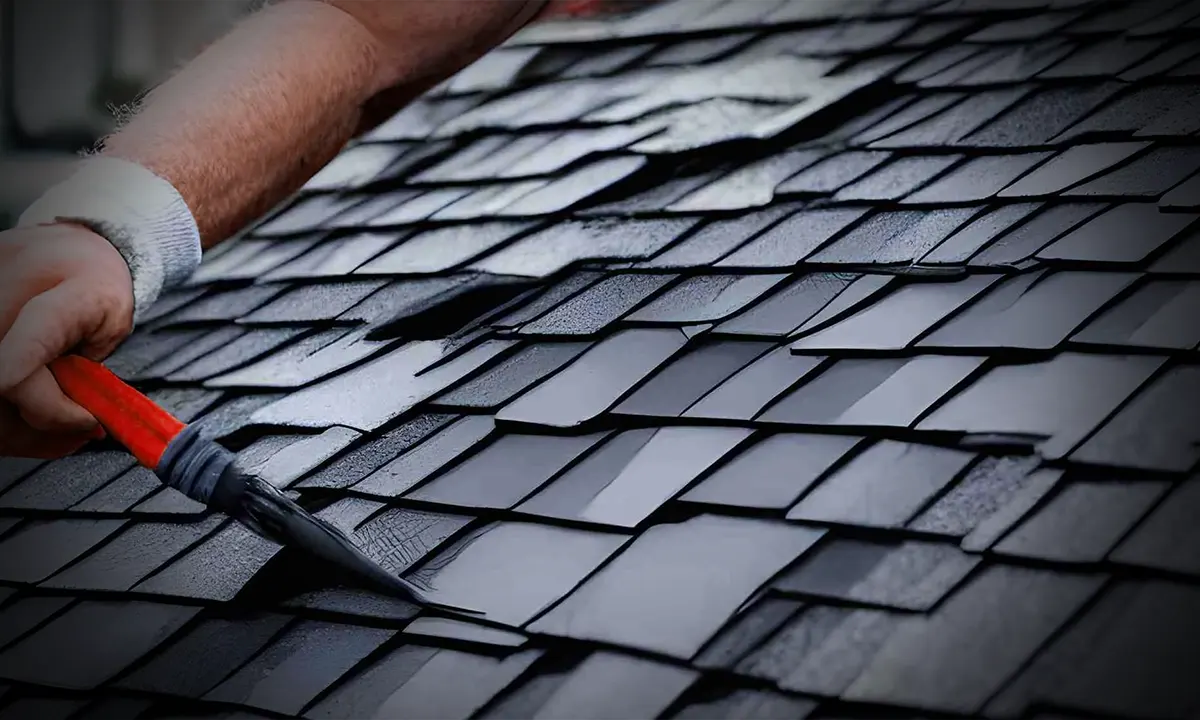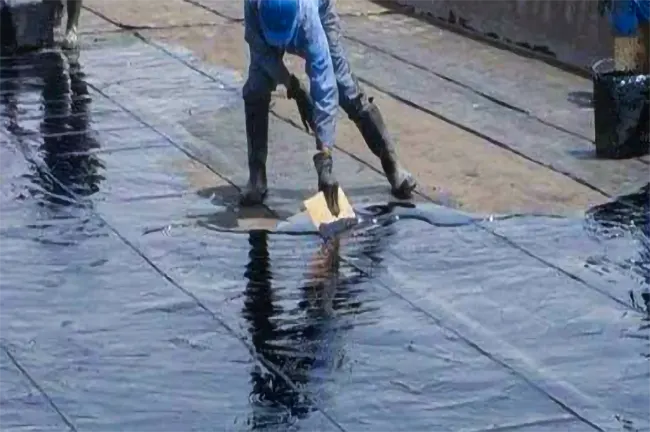Bituminous paint has always been the go-to solution for everyday protective coatings on roofs, metals, floors, etc. due to its versatility and wallet-friendliness. However, choosing the appropriate Bituminous paint type plays a key role in the success or failure of the painting. Only by combining the actual painting environmental factors and fully considering the problems you may face can you make the right choice.
How to Make the Right Choice of Asphalt Paint?
As we mentioned in another blog, asphalt paints come in many different types due to their composition. For some friends, it may be a bit difficult to pick out the asphalt paint that suits them among the wall-full of paint shelves. Don’t be afraid, you will be able to make the right choice by considering the aspects I explain below based on the actual situation.
Consider the Use
First of all, as buyers, we need to clearly know our specific needs: What do we need paint for? Different asphalt coatings serve different purposes, and identifying your goals can save time and avoid unnecessary renovations in the future.
- If the current requirement is to prevent water damage (basement, roof or outdoor ground), you should look for asphalt paints that are specially formulated for waterproofing. The material composition of this paint can form a thick, impermeable waterproof barrier.
- Want to protect the roof? It should be mainly oriented to resist UV rays and temperature fluctuations. Asphalt paints specifically for roofs are usually formulated to help the roof fight all kinds of bad weather together.

UV resistant roof bituminous paint
- Rust and corrosion are the enemies of metal structures. Without considering aesthetics, it is a good choice to choose asphalt paints with excellent corrosion resistance to protect metal surfaces (such as tanks, pipes or industrial equipment). If you care more about aesthetics, you can go to the metal paintstore next door. If you have requirements for hardness, you should go to the enamel paint
- There is no specific functional preference, it just needs to be painted on different substrates for simple and basic surface protection. Then it is recommended to choose a versatile asphalt paint, which can provide basic protection for a variety of surface types seen daily (wood, concrete, masonry).
Consider key performance
Now that we have a clear idea of where we are going to use asphalt paint, it’s time to think about the key performance requirements for our needs. After all, when applying asphalt paint in complex real-life scenes, there is always a primary functional requirement. You can consider the following 4 aspects:
- Adhesion: Asphalt paint with strong adhesion can stay in place on hard surfaces or areas prone to wear.
- Corrosion Resistance: Asphalt paints with this feature protect metal structures from rust and deterioration caused by moisture, salt, and other environmental factors.
- Heat Resistance: High temperature resistant asphalt paint prevents it from degrading or losing its protective properties at high temperatures. This is especially important in high-temperature industrial workshops and hot climates.
- UV resistance: Long-term UV exposure will cause any coating to crack and peel. Rooftops or surfaces that are often exposed to the sun need to choose asphalt paint that provides additional UV protection.
Balance wallet and benefits
Anyone who takes too much money out of their wallet at one time to buy Bitumen paint is bound to be a little reluctant. But you have to know that although it is tempting to choose the cheapest option, please consider the long-term cost benefits. Spending a little more on high-quality bitumen paint can save you a lot of repair or repainting costs later. It’s important to find a balance between price and performance. If you’re not sure about the best price range, check online forums such as Reddit or Quora for recommendations from people who have used these products in real conditions. Or compare different bitumen paint suppliers on the coatingsdirectory platform.
It’s important to choose bitumen paint based on the specific needs of the project. I believe you are like me: you don’t want to renovate the coating frequently. Consider the expected service life of asphalt paint and try to choose a paint that can maintain long-term performance and avoid frequent touch-ups or re-coatings. How long Bitumen paint can be used in practice needs to be evaluated from many aspects. Follow me and continue to read below.
How Long can Bitumen Paint be Used?
No one wants to see that the Bitumen coatings they spent a lot of time and money on cannot perform their intended protective functions as expected. As a very durable coating material, Bitumen paint has a long service life and can be used for more than 3 years under normal circumstances. It can even reach 10 years on porous surfaces such as wood and stone. Let’s take a look at the service life range of bitumen paint in common applications in daily life. Let’s take a look at the average service life range of bitumen paint in daily life.
| Application Area | Expected Lifespan | Factors Influencing Longevity |
|---|---|---|
| Fences (Wooden or Metal) | 3–5 years | Exposure to weather, moisture, and physical wear |
| Roofs (Flat or Sloped) | 5–10 years | UV exposure, temperature fluctuations, weathering |
| Parking Lot Asphalt & Concrete | 3–7 years | Traffic, weather, surface condition, UV exposure |
| Wooden Surfaces | 2–4 years | Moisture exposure, temperature changes, wear |
| Steel Surfaces | 5–7 years | Humidity, rust, corrosion risks, UV exposure |
Key Factors Affecting the Lifespan of Asphalt Paint.
The above is the service life of asphalt coating in different applications. Asphalt paint can provide excellent durability for a corresponding limited period. But in reality, the specific service life will fluctuate due to several key factors – mainly the coating surface, environmental conditions, correct application and daily maintenance. These factors largely determine the service life of asphalt paint.
- The environment in which asphalt paint is used plays an important role in its service life. If the painted surface is exposed to strong ultraviolet sunlight for a long time (such as roofs or outdoor fences), it will inevitably cause it to degrade faster. Asphalt coatings with UV resistance can help extend its service life.
Bitumen coatings on surfaces such as wood or metal are easily affected by moisture. In a humid environment for a long time, wood and metal will inevitably absorb moisture, causing the paint to fall off. In this case, a primer can be added to maximize the life of the asphalt paint. - The type of surface being painted and the preparation will also affect the life of the asphalt paint. Whether it is porous wood, concrete or asphalt pavement, or a smooth metal surface, proper cleaning & repair of surface foreign matter and imperfections (cracking, holes) will allow asphalt paint to adhere better.
Never rush the job; if the surface is not properly prepared, it will only reduce the effectiveness of the asphalt paint. - As a practical paint, Bitumen paint is subject to daily wear and tear. In areas with heavy daily wear and tear (such as parking lots or roofs), a new coat of asphalt paint every 2-3 years can continue to reinforce its effectiveness. Regularly cleaning the surface of Bitumen coatings from dust, debris and contaminants will help protect the coating and reduce buildup that can cause damage.
- The quality of the application process is as important as the ingredients of the Bitumen paint itself. Thin coats wear faster, so apply as thick as your budget allows (thicker, more durable). But instead of hitting your target thickness in one go, apply multiple thin coats, which usually work better than one thick coat. Don’t rush this process, and wait for the previous layer of Bitumen paint to completely dry before applying the next one.
This drying process works best in warm, dry weather. Use in extremely high humidity, cold or hot weather may result in improper curing. Sunny days with temperatures between 50°F and 85°F are the best times to apply.
Thicken the Bitumen coating again
When we have selected the asphalt coating required for our project, applied it correctly, and maintained it regularly, asphalt coatings can provide us with long-term protection.
Common Problems and Solutions of Bituminous Paint.
No paint job is perfect, and asphalt paint is no exception. However, being aware of the problems that can arise and trying to avoid them can save time and money. Addressing problems that may arise during or after the painting process is equally important to extend the life of your bituminous paint.
| Problem | Cause | How to Avoid This Problem |
|---|---|---|
| Peeling or Flaking | Poor surface preparation (e.g., dust, grease, or rust) before application | Clean and prepare the surface thoroughly; ensure it’s dry and free of contaminants. |
| Blistering or Bubbling | Moisture trapped beneath the paint layer or painting on a damp surface | Paint only on dry surfaces; allow sufficient drying time between coats and avoid humid conditions. |
| Cracking | Application of overly thick layers or exposure to extreme temperature changes | Apply thin, even coats; ensure proper curing before subjecting the surface to temperature extremes. |
| Uneven Finish | Inconsistent application or failure to stir paint properly | Stir the paint thoroughly before use; apply evenly with the right tools (brush, roller, etc.). |
| Shortened Lifespan | Using low-quality paint or insufficient maintenance | Invest in high-quality bituminous paint and perform regular maintenance, including re-coating. |
| Poor Adhesion | Surface incompatibility or use of an unsuitable primer | Test paint adhesion on a small area; use a primer specifically designed for the surface type. |
| Discoloration or Fading | UV exposure or environmental pollutants | Choose bituminous paint with added UV resistance; apply a protective topcoat if needed. |
| Corrosion (on Metal Surfaces) | Incomplete coverage or exposure to harsh conditions | Ensure full coverage during application; add a rust-inhibiting primer and regular maintenance. |
Bituminous Paint vs Other Protective Coatings: Which Is Better?
When choosing a protective coating, choosing the right one can be challenging. Bituminous coatings are known for their affordable prices and excellent waterproof, corrosion resistance, and durability, making them ideal for pipes, concrete, and roofing materials that are exposed to the elements. But it also has limitations in terms of color diversity and visual beauty. Based on reader feedback, I have listed several common paints that have similar application scenarios to asphalt paint, hoping to help you better distinguish them.
- Acrylic paints, which have a glossy surface, are UV-resistant and dry relatively quickly, are often used in decorative and outdoor applications, but they don’t offer the same protection from moisture or chemicals as asphalt paints.
- Epoxy coatings are designed for industrial and commercial heavy-duty applications that require high durability and can withstand a variety of chemicals and extreme wear and tear. But the cost is relatively higher and requires more preparation.
- Polyurethane coatings provide a good balance between flexibility and durability. It can resist UV rays, has a smooth surface, has a certain aesthetic, and is very durable, but the price is also relatively expensive.
- Silicone coating is the first choice for extreme environments that require high heat resistance, such as industrial equipment and roofs, but its high price is only cost-effective when used in extreme conditions. In general environments, Bituminous Paint is the most economical choice.
| Coating Type | Advantages Compared to Other Coatings | Key Differences | Best Use Cases |
|---|---|---|---|
| Bituminous Paint | Cost-effective, excellent water and corrosion resistance | Not UV-resistant; limited aesthetic options; best for surfaces exposed to moisture | Waterproofing foundations, roofing, pipelines, industrial equipment |
| Acrylic Paint | Superior UV resistance, quick-drying, environmentally friendly | Less durable under harsh conditions; limited resistance to chemicals and moisture | Decorative coatings, exterior walls, areas with high sunlight exposure |
| Epoxy Coatings | Exceptional durability and chemical resistance; ideal for heavy-duty environments | Requires meticulous surface preparation; relatively expensive; not UV-stable | Industrial floors, marine applications, chemical plants |
| Polyurethane Paint | Flexible, highly durable, UV-resistant, smooth and glossy finish | More expensive; may require primer; limited thickness per coat | Automotive finishes, machinery, high-traffic surfaces |
| Silicone Coatings | Outstanding heat and UV resistance; excellent for extreme conditions | Highest cost; specialized for high temperatures and weathering resistance | High-heat equipment, extreme-weather roofing, industrial ovens |
Now that you know the differences between asphalt paint and other coatings like acrylics, epoxies, polyurethanes, silicones, and more, you’ll have a clearer direction on how to make an informed choice. Knowing the solutions to common asphalt paint problems can keep it providing the protection it needs for a long time. We always believe that “the right decision starts with the right information”, and in addition to providing some knowledge guides, the CoatingsDirectory.com platform also provides a one-stop digital search system. You can easily find trusted Bituminous coatings suppliers and local door-to-door services for your coating needs here. If you have questions or insights to share, please comment below to help more asphalt paint enthusiasts.
FAQs
Does bituminous paint peel or flake?
When applied improperly or exposed to harsh conditions for a long time, bituminous paint can peel or flake. Proper surface preparation, such as cleaning and priming, is essential to ensure a strong adhesion.
How long does asphalt fence paint last?
Asphalt fence paint typically lasts 3 to 5 years, depending on weather conditions and maintenance. Regular inspections and touch-ups can extend its life.
Can bituminous paint be used on metal?
Of course. If aesthetics are not a requirement, bituminous paint’s excellent corrosion resistance works well on metal surfaces. It can help reduce rust on steel structures, pipes, and metal fence surfaces in daily life.
Is bituminous paint waterproof?
Asphalt paint is highly water-resistant due to its tar-containing properties. Can be used on roofs, foundations and water tanks to create a protective barrier.
What surfaces are suitable for bituminous paint?
Bituminous paint is very versatile and its adhesion and protective properties are suitable for concrete, metal, wood and masonry.

